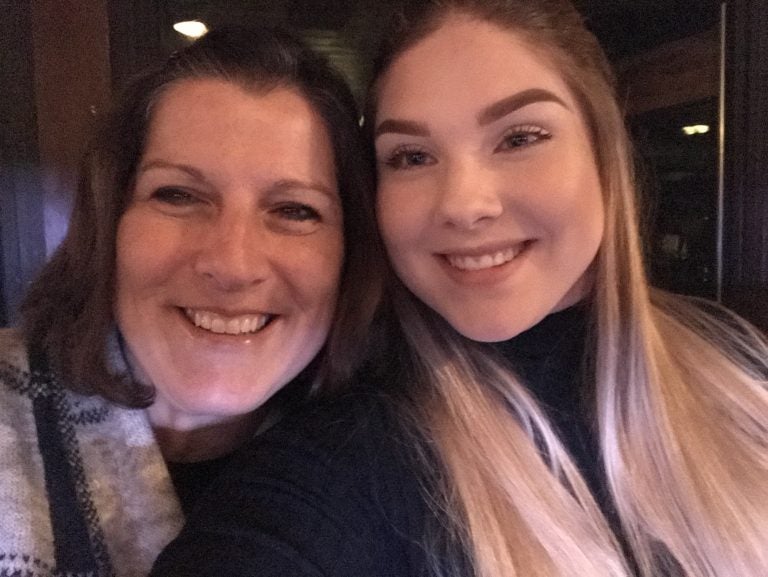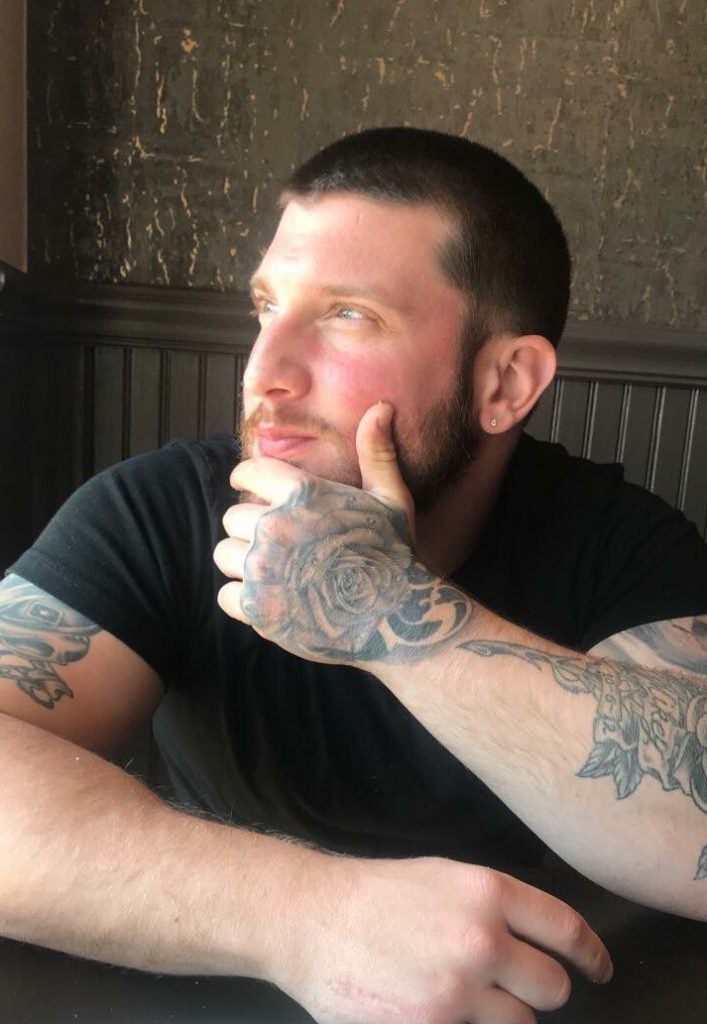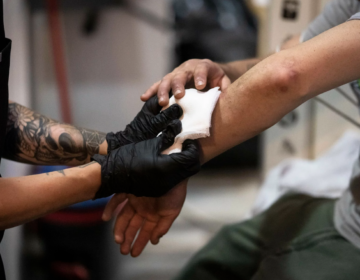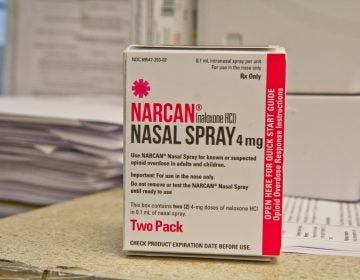Siblings also struggle when addiction strikes a family
The basic issue is trust, one expert says: A trust that’s been broken by a brother or sister, and sometimes in deeply painful ways.
Listen 4:49
Deanna Rubles (left) and her daughter Sara Romain. Sara's brother Zachary has a substance use disorder. (Courtesy of Deanna Rubles)
This story is part of our Modern Kids series.
When he was using heroin, his life spiraling, Zachary Romain’s family members felt like they were spiraling too.
He had started smoking pot at 14 and moved on to harder drugs at 16. He joined the Army after high school but was discharged because of his substance use. He moved back into his mother’s home in Franklinville, New Jersey until she kicked him out. Just as he was starting to hit bottom, he realized his older brother, Scott, was using too.
Zach’s younger sister, Sara Romain, was 15 when he started using heroin. He would steal from her to pay for his habit.
“He broke in through my window and stole everything, like anything that was important to me,” Sara said.
“Everything,” Zach said. “Anything I knew that was worth a value, I took it, and I sold.”

Addiction is sometimes called a family disease, so strong are the ripple effects for the parents and children of people struggling with substance use disorders. Many feel they are grappling with their loved ones’ addiction alone. But the adolescent siblings of substance users may feel more alone than most.
Sara resented that Zach’s and Scott’s addictions were consuming her mother and grandmother. Zach could be highly manipulative, she said, telling their mom that he would kill himself if she didn’t give him money.
“It makes me so frustrated because she thinks she has to give them everything they ask for or they’re actually going to harm themselves,” said Sara. “How can you say that to your mom?”
There are support groups for parents with addicted children, for children with addicted parents, but little support for young people dealing with a sibling’s addiction.
“Kids aren’t prepared for the kinds of emotions that they’re experiencing watching a sibling go through these kinds of crisis,” said Tim Portinga, a psychologist and clinical supervisor for mental health staff at the Hazelden Betty Ford Foundation, a nonprofit addiction-treatment provider with sites in seven states.
“I hear this just consistently over and over again from siblings: that nobody understands how painful it was to have their brother or sister not show up at their basketball games, or to see their brother or sister intoxicated and passed out on the floor, or to try to understand why their brother and sister are in trouble with the legal system again,” Portinga said.
“They don’t know why this is happening. They love their brother [or] sister. They just can’t understand what this is all about.”
Siblings often left in the shadows
It’s difficult to find treatment for minors who are struggling with a substance use disorder. The Philadelphia Inquirer reported last year that Pennsylvania had just eight treatment facilities that accepted patients under 18.
Their adolescent siblings, meanwhile, may go totally unnoticed. Unlike myriad studies on how addiction affects the relationship between parents and children, Portinga said there’s little research into the impact on siblings.
But he sees it daily in his own work, treating patients in their late teens and early 20s at a Hazelden Betty Ford facility in Plymouth, Minnesota. The facility also offers therapy to parents and siblings of those in treatment. Because adolescent programs can be so hard to find, the center has patients from across the country.
Talking to them and their families, Portinga said, it’s clear that siblings struggle in ways that are distinct from parents. They may feel embarrassed by their addicted brothers or sisters, or lonely when they drop out of their lives.
“But the basic thing keeps coming back to the trust that’s broken, and often in ways that are deeply painful,” said Portinga. “So siblings build up these defenses against building relationships. They get really fearful around trust. They have really complicated ideas about what a brother or sister should be or could be.”
Often, parents are overwhelmed themselves and not functioning well. Siblings may try to step into the breach, acting as a parent to the sibling who is struggling. Others might feel resentful that so much of their parents’ attention is suddenly focused on the sibling in crisis.
And, sometimes, siblings can influence each other’s substance use.
“It’s a particularly painful thing because siblings will sometimes, under the umbrella of trying to be kind brothers and sisters, will often share substances,” said Portinga. “I often hear stories amongst my own clients about how their first using experiences happened with a brother or sister.”
That’s what happened with Zach Romain and his brother. Scott, who is seven years older, brought Zach to his first parties, where he tried weed and alcohol for the first time. Zach introduced Scott to the pain pills he started stealing from the family medicine cabinet when he was 16.
Now, Zach is 22 and Scott is 29. When Zach got clean last year, his brother was still using. Their relationship hasn’t recovered either.
“I get angry at him for putting my family through what he’s doing, but I did the same exact thing,” said Zach. “I just try to stay away from him, and any time I do go around him, I make sure I’m with a family member.”
A fractured family
Sara hasn’t spoken to Scott in over two years, ever since he overdosed outside their family home right before Christmas. When he woke up, he insisted he didn’t have a problem. Sara was disgusted.
“If you don’t want to help yourself, I don’t want to help you,” she said.
Today, at 21, Sara’s relationship with Zach is more complicated. They were never particularly close, she said: He had anger issues when they were kids, and he would make fun of her with his friends.
But last year, Zach’s girlfriend had a baby, and Zach went to rehab. After a year of inpatient treatment at MVP Recovery in Delaware County, he moved back in with Sara and their mom, Deanna Rubles, in Franklinville.
“Sara was very resentful to him for taking everything. She was resentful to me for letting him be in the house. She was so mad at me, and she’s still kind of upset that I let him come back in,” Rubles said.
Rubles and Zach have a frank rapport, sitting across a table from each other as they tell their own stories of Zach’s addiction, and Scott’s addiction and Sara’s reticence to allow either back into her life.
Rubles has struggled, too, as she tries to help her two sons. She recently started a support group for family members of addicted loved ones. Those who attend are no strangers to the difficulties that siblings face, either. One mother has struggled to explain to her children under 10 the fatal overdose of their older sibling.
Sara hasn’t attended the group her mother started. Overall, she has less patience for her brothers. For months, she didn’t want to talk for this story. When she agreed, Sara said she was sick of her mom and grandmother saying that she was insensitive for the way she treats her brothers. She said she just doesn’t see that they’re trying to get better and that it’s affecting everyone in the family.
“I’m just ready for him to move on. It’s hard to watch at this point. Do it for everyone else,” she said. When Zach moved back in, Sara made sure to put locks on her door.
Despite their strained relationship, Zach said his sister did the right thing. His mother and other family members were still giving him money and support while he was using, but Sara was resolute.
“Not talking to me or not helping me at all. That just kind of made me feel that hopelessness that, you know, pushed me to that point,” he said — the point where he wanted to get help.
Once, in the hospital after an overdose, Zach tried to make amends.
“I broke down, and I was like, ‘I don’t want things to go the way they did before, and I don’t want to not talk to you again because, like I love you, and I just want you to understand,’ ” he said he told Sara.
They’ve made some progress. Sara is the godmother of Zach’s daughter. They had lunch together the day of this interview.
“It just makes me happy, really happy. Even though I wish my brother was here too,” Zach said.
But until Scott stops using, Zach doesn’t know if that will happen.
“Some relationships you don’t get back. You learn that in Alcoholics Anonymous,” he said.
And they can be so fragile. The weekend after Sara was interviewed for this story, Zach relapsed, after nearly a year of being sober.
Sara was the one who found him, needle still in his arm. And Sara was the one to rip it out.
WHYY is your source for fact-based, in-depth journalism and information. As a nonprofit organization, we rely on financial support from readers like you. Please give today.







